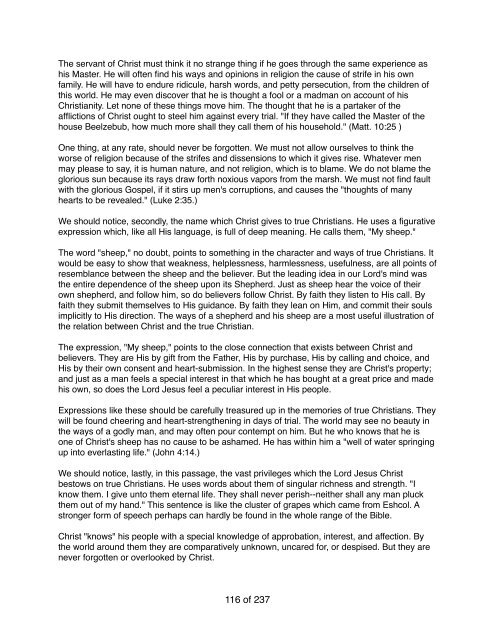J. C. Ryle John
John Charles Ryle (May 10, 1816 - June 10, 1900) was an evangelical Anglican clergyman and first Bishop of Liverpool. He was renowned for his powerful preaching and extensive tracts.
John Charles Ryle (May 10, 1816 - June 10, 1900) was an evangelical Anglican clergyman and first Bishop of Liverpool. He was renowned for his powerful preaching and extensive tracts.
Create successful ePaper yourself
Turn your PDF publications into a flip-book with our unique Google optimized e-Paper software.
The servant of Christ must think it no strange thing if he goes through the same experience as<br />
his Master. He will often find his ways and opinions in religion the cause of strife in his own<br />
family. He will have to endure ridicule, harsh words, and petty persecution, from the children of<br />
this world. He may even discover that he is thought a fool or a madman on account of his<br />
Christianity. Let none of these things move him. The thought that he is a partaker of the<br />
afflictions of Christ ought to steel him against every trial. "If they have called the Master of the<br />
house Beelzebub, how much more shall they call them of his household." (Matt. 10:25 )<br />
One thing, at any rate, should never be forgotten. We must not allow ourselves to think the<br />
worse of religion because of the strifes and dissensions to which it gives rise. Whatever men<br />
may please to say, it is human nature, and not religion, which is to blame. We do not blame the<br />
glorious sun because its rays draw forth noxious vapors from the marsh. We must not find fault<br />
with the glorious Gospel, if it stirs up men's corruptions, and causes the "thoughts of many<br />
hearts to be revealed." (Luke 2:35.)<br />
We should notice, secondly, the name which Christ gives to true Christians. He uses a figurative<br />
expression which, like all His language, is full of deep meaning. He calls them, "My sheep."<br />
The word "sheep," no doubt, points to something in the character and ways of true Christians. It<br />
would be easy to show that weakness, helplessness, harmlessness, usefulness, are all points of<br />
resemblance between the sheep and the believer. But the leading idea in our Lord's mind was<br />
the entire dependence of the sheep upon its Shepherd. Just as sheep hear the voice of their<br />
own shepherd, and follow him, so do believers follow Christ. By faith they listen to His call. By<br />
faith they submit themselves to His guidance. By faith they lean on Him, and commit their souls<br />
implicitly to His direction. The ways of a shepherd and his sheep are a most useful illustration of<br />
the relation between Christ and the true Christian.<br />
The expression, "My sheep," points to the close connection that exists between Christ and<br />
believers. They are His by gift from the Father, His by purchase, His by calling and choice, and<br />
His by their own consent and heart-submission. In the highest sense they are Christ's property;<br />
and just as a man feels a special interest in that which he has bought at a great price and made<br />
his own, so does the Lord Jesus feel a peculiar interest in His people.<br />
Expressions like these should be carefully treasured up in the memories of true Christians. They<br />
will be found cheering and heart-strengthening in days of trial. The world may see no beauty in<br />
the ways of a godly man, and may often pour contempt on him. But he who knows that he is<br />
one of Christ's sheep has no cause to be ashamed. He has within him a "well of water springing<br />
up into everlasting life." (<strong>John</strong> 4:14.)<br />
We should notice, lastly, in this passage, the vast privileges which the Lord Jesus Christ<br />
bestows on true Christians. He uses words about them of singular richness and strength. "I<br />
know them. I give unto them eternal life. They shall never perish--neither shall any man pluck<br />
them out of my hand." This sentence is like the cluster of grapes which came from Eshcol. A<br />
stronger form of speech perhaps can hardly be found in the whole range of the Bible.<br />
Christ "knows" his people with a special knowledge of approbation, interest, and affection. By<br />
the world around them they are comparatively unknown, uncared for, or despised. But they are<br />
never forgotten or overlooked by Christ.<br />
116 of 237




